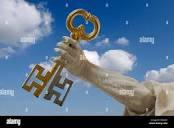
The reading from Isaiah refers to Shebna, who was the steward of Hezekiah, King of Judah. This man was described as a “disgrace to his master’s house”: apparently, in an act of self-aggrandisement, he had carved out a tomb for himself. He was replaced with Eliakim who was entrusted with the office and given the key of the House of David. He too would eventually fail.
In the gospel, Peter recognized Jesus as the Christ. Jesus then entrusted to him the keys of the Kingdom of Heaven. Peter, like all of us, had his weaknesses, but they were also his strengths because his self-confidence, which at times could be overweening, made him a born leader. Throughout history there have been many popes who - like Shebna - misused their office for their own glorification. The ruins at Avignon tell their own story, and Julius II (1443-1513) commissioned Michaelangelo to construct a magnificent tomb for him. On the other hand, beginning with St Peter, there have been many holy popes who helped their flock to grow closer to Jesus and to know him better. Perhaps the most effective way they did this was to harness the lived experience of the people of God. This was especially true of Pope St John XXIII, who initiated the great council of Vatican II. We are fortunate that today Pope Francis seems to be giving the same kind of leadership.